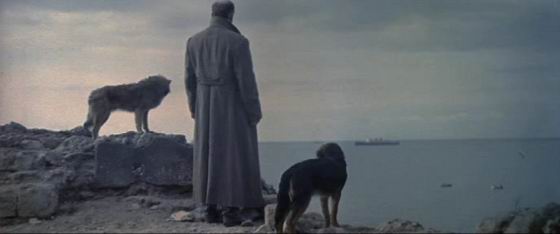
FOR THE SAKE OF RUSSIA focuses on Russian film and dissecting popular myths about Russian or Soviet life, characterizations of the Russian Soul as seen through film, and of course the occasional gangster movie.

Flight is a film based on a play by Mikhail Bulgakov, you know, the guy that wrote your favorite book Master & Margarita. Bulgakov’s taste for the zany is a little less prevalent here, but his ability to reflect on the Russian Soul is ever present. The Russians have a term for a very specific type of depression – тоска (toska), and that’s what I want to discuss, is the portrayal of toska in two characters, and how fucking crushing it is. The movie follows the lives of a few members of the White Army in the Russian Civil War following the Bolshevik Revolution of 1917. Part one takes place in Russia, while part two follows the soldiers into exile in Constantinople. If you’ve got 3 hours and want to delve into the deepest recesses of a depression that only the Russians have been able to name, this is the movie.
As defined by Russia’s master of the English language, Vladimir Nabokov, you know, the guy that wrote your other favorite book Lolita (you pervert), toska is a “sensation of great spiritual anguish, often without any specific cause, a dull ache of the soul, a longing with nothing to long for.” We’ve all probably experienced this feeling on our own, otherwise we wouldn’t be into punk or slasher films, whatever the case may be.
In part one, General Roman Khludov is still in Russia when he utters, “Where is the Russian Empire?” A despondent general, he continually experiences toska in its varying forms. He is consistently seen in a firm and still seated position staring into space throughout. His eyes, though big and bulging, are also cold and lifeless. “You’re disturbing the lord in vain, he has long since abandoned us,” the general mutters to a group of praying monks. He gives orders, even a death sentence for an outspoken soldier in a very dry, matter-of-fact manner: “Hang him. I can’t bear the sight of him.” Toska is an ugly thing, no doubt.

More screen time is given in part two to General Charnota, while LIVIN’ IN EXILE. This General displays another aspect of toska, “it may be the desire for somebody or something specific, nostalgia, love-sickness.” Charnota consistently makes references to being lost or sad. He curses Constantinople’s daily life, and coldly goes through the motions; his wife eventually leaves him and he is totally ambivalent. It seems clear that his displacement from MOTHER RUSSIA is taking its toll. Perhaps in an effort to find a purpose in his new life, he eagerly seeks to help fellow exile Privatdozent Golubkov better the life of a woman abandoned by her husband during the war. Golubkov and Charnota head to Paris, where her husband is said to be living quite comfortably. Upon their arrival, Charnota challenges the man to Baccarat, and takes him for $20,000 by morning after a long night of drunken cards. This does little to satisfy the feeling of toska in the general. He immediately laments “I’ve won all this cash…why am I so sad?” It’s that the feeling is completely inescapable and incurable that makes it so hard. The two quickly leave, and their exit route brings them across some beggars along the Seine River. Charnota tells them “if you try hard enough, you can get anything begging. Money, fame, power. But never your own country, gentlemen…Russia won’t fit into a hat.” Here he confirms all suspicions that his expatriate status is what has crushed his spirit, and in his ramblings he even uses the word toska. Seriously, Imagine having such a cloud over your head that you could not be phased by either a) your wife leaving you OR b) winning $20 g’s in the name of charity. I mean, we’ve all been there.

Khludov appears in the second half of the film as well. However, still, in contradistinction to Charnota whose toska is very clearly related to his longing to be back in Russia, Khludov’s condition is still vague and undefined. His first appearance in Constantinople is from behind, standing on a cliff, still in his long army coat, overlooking the Black Sea (the body of water separating the city from Russia.) His expressions and mannerisms are the same as in part one, not having worsened significantly. From what he had said earlier regarding the Russian Empire, his longing is more likely for Russia the abstraction, as opposed to Russia the place. Even if he returned home, he’d be living now in the USSR. Maybe he was a landowner before, or someone of import. It’s that same feeling that some people have for (New York/Boston/Philadelphia) before “hipsters” lived there, there’s a desire for something more authentic, that you know and love. Whatever it is, that feeling you have of emptiness or longing for days or places gone by, when it becomes all-consuming, then you might have toska, and you might become a lost bumbling Charnota seeking purpose, or a resigned Khludov looking over a cliff waiting patiently for the end in a JAIL OF DEPRESSION.




